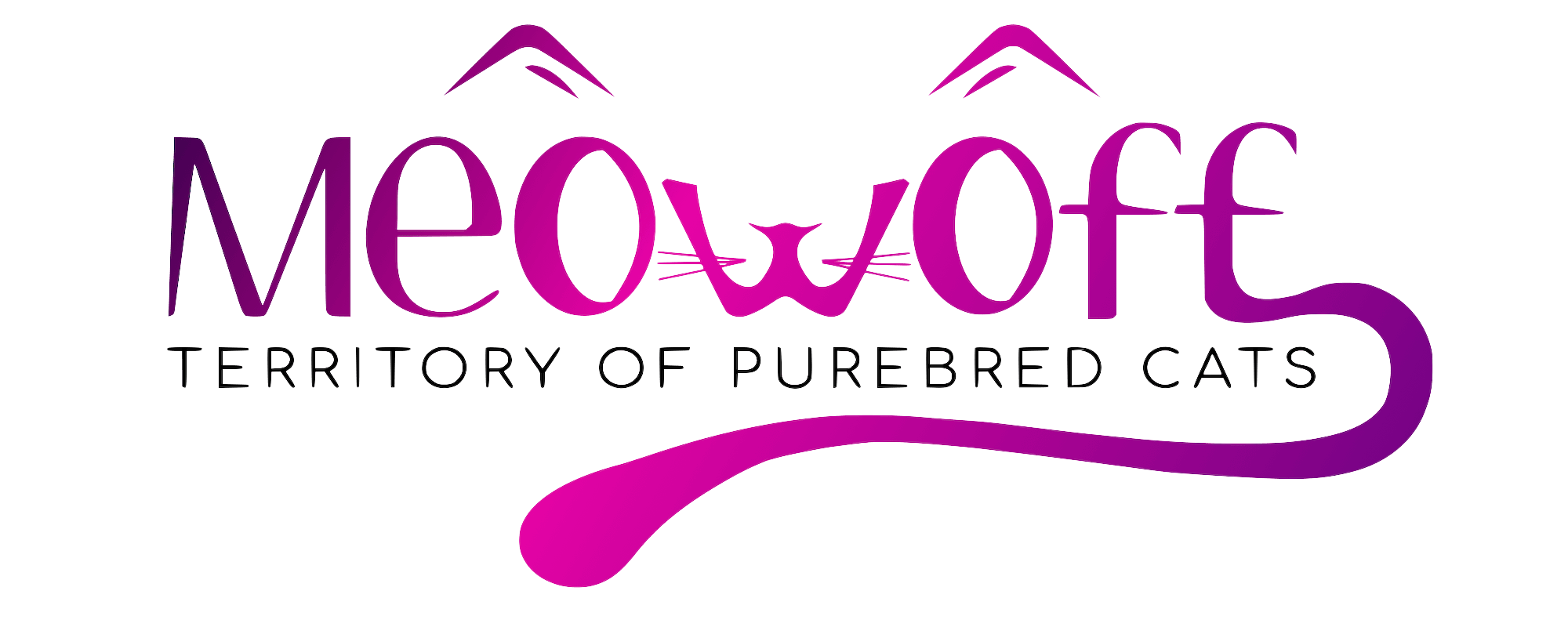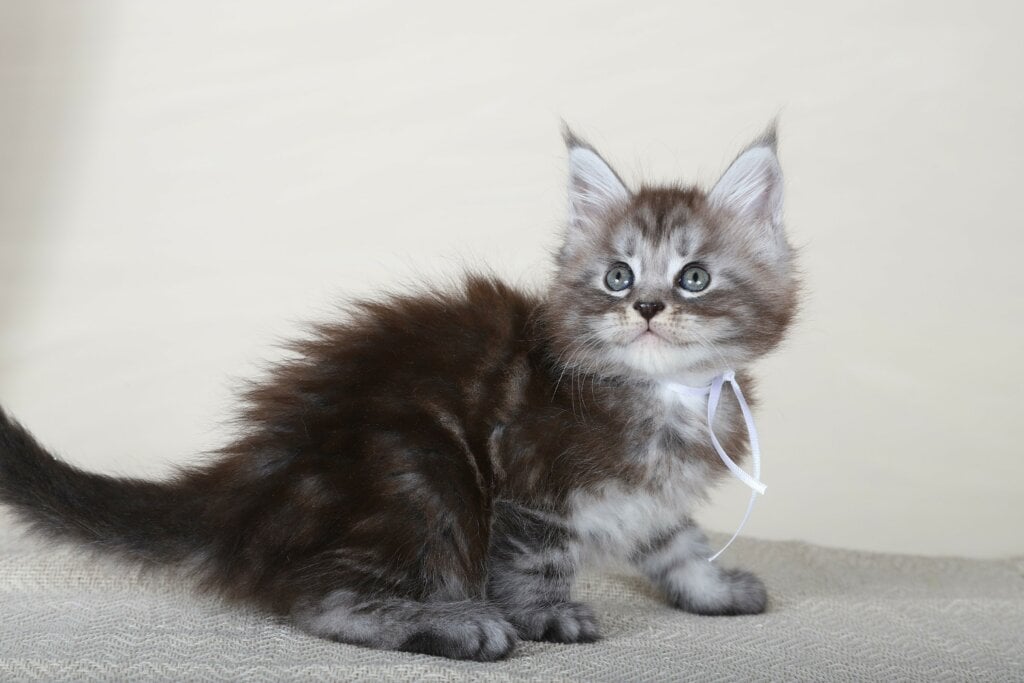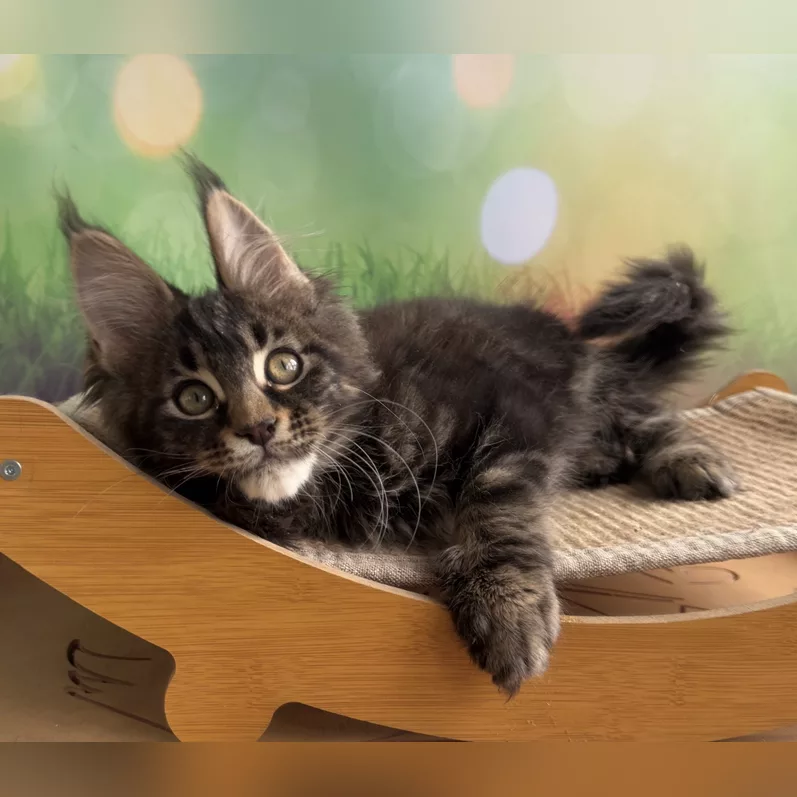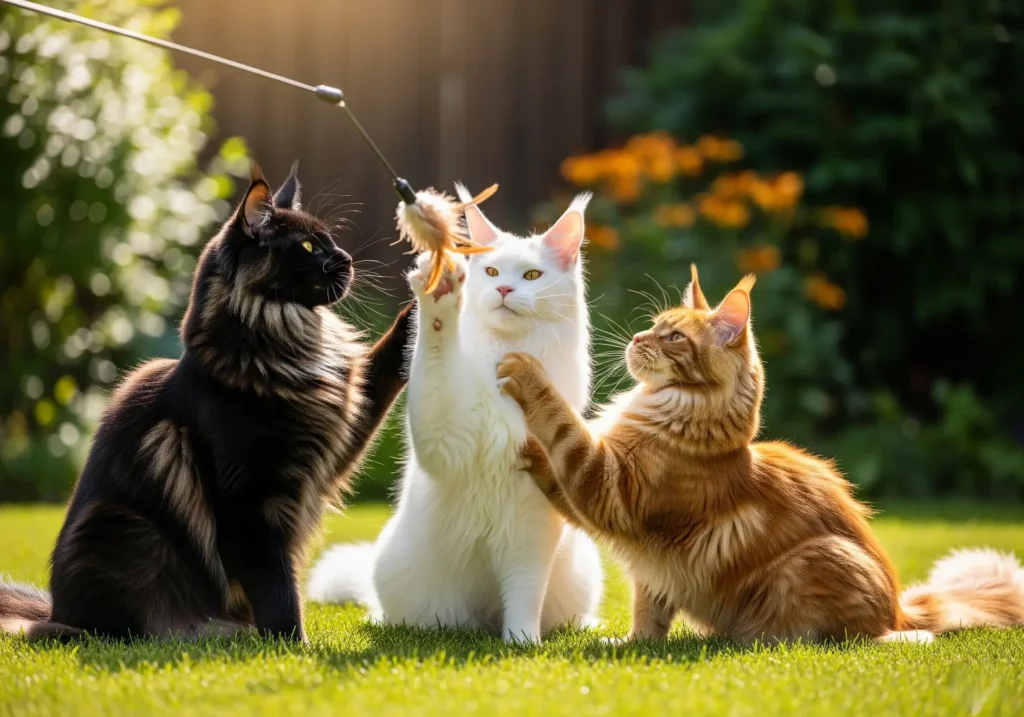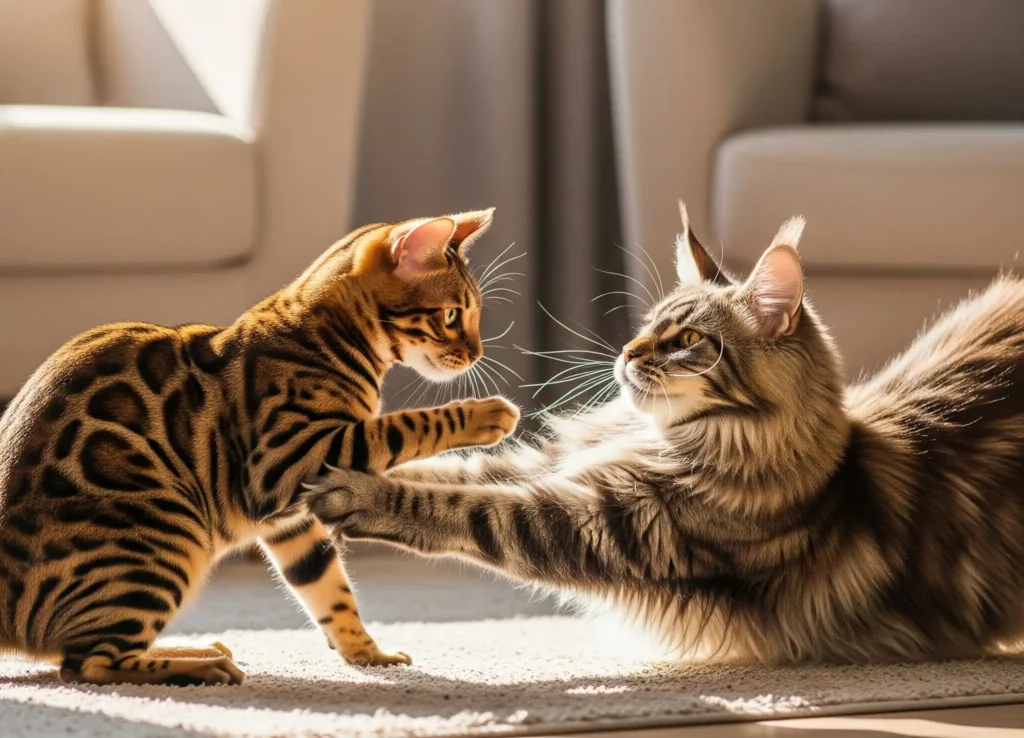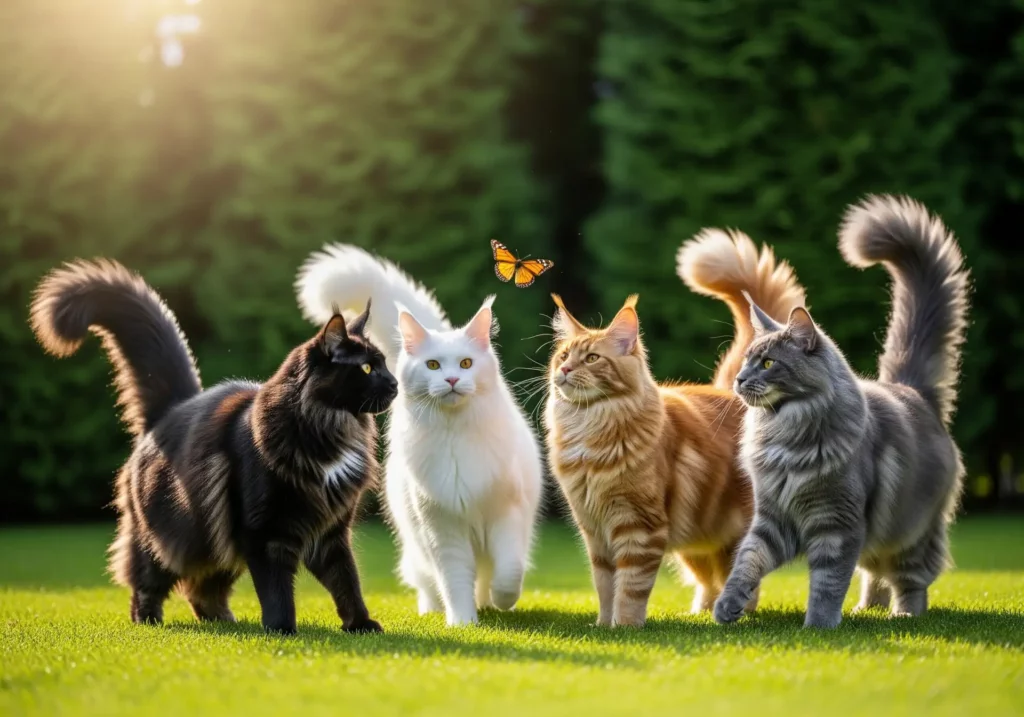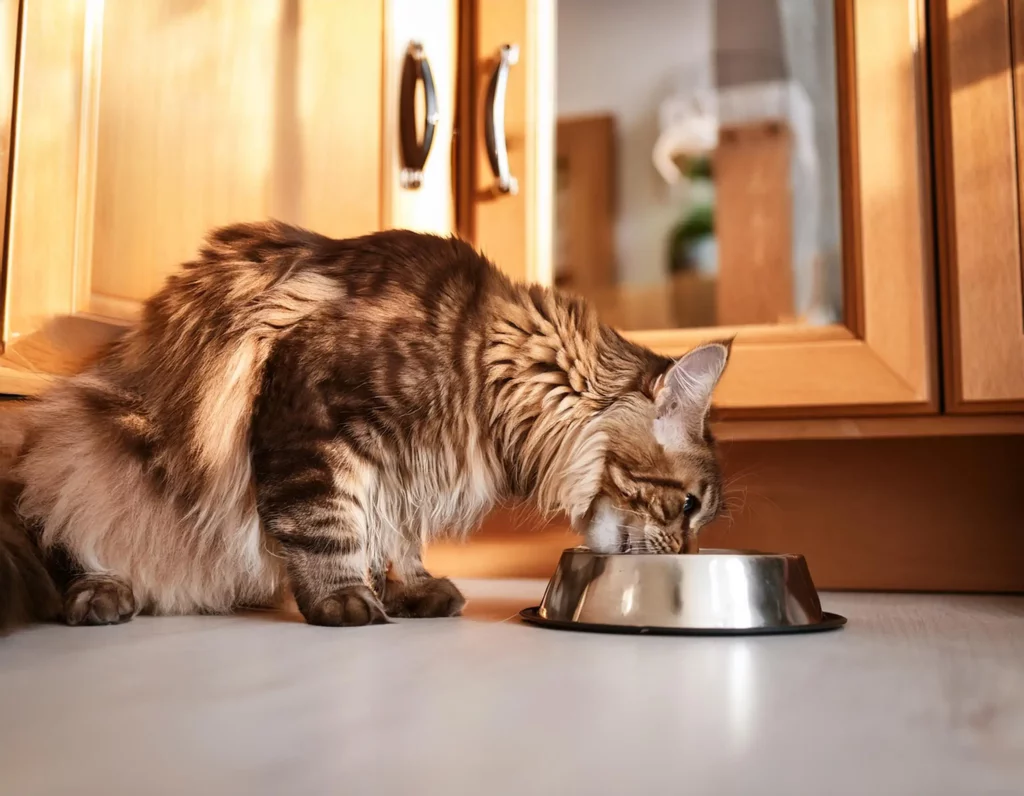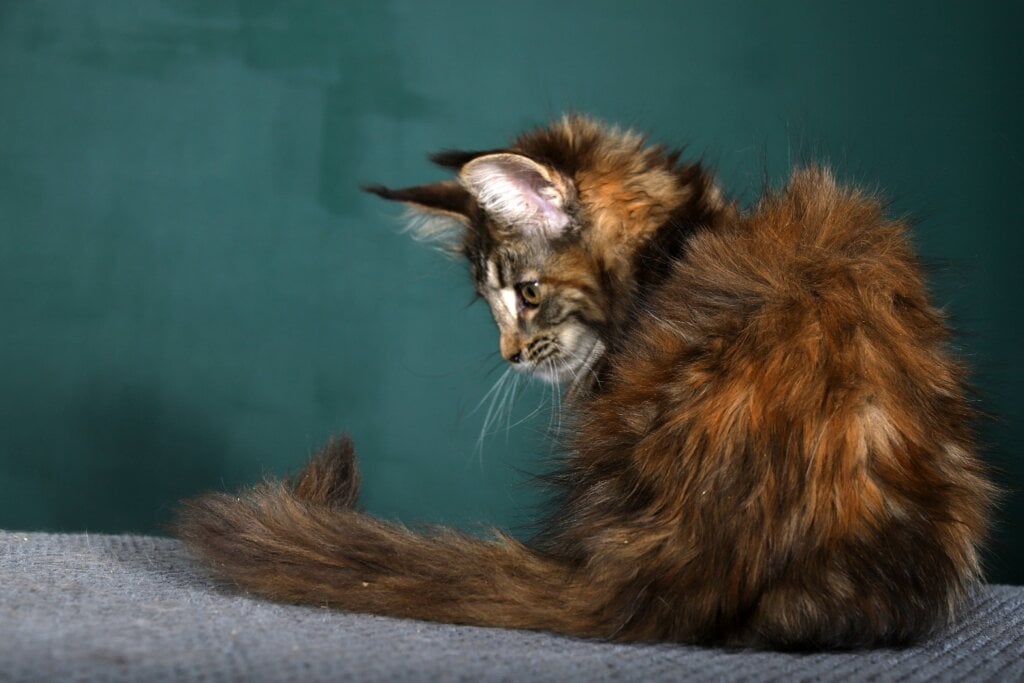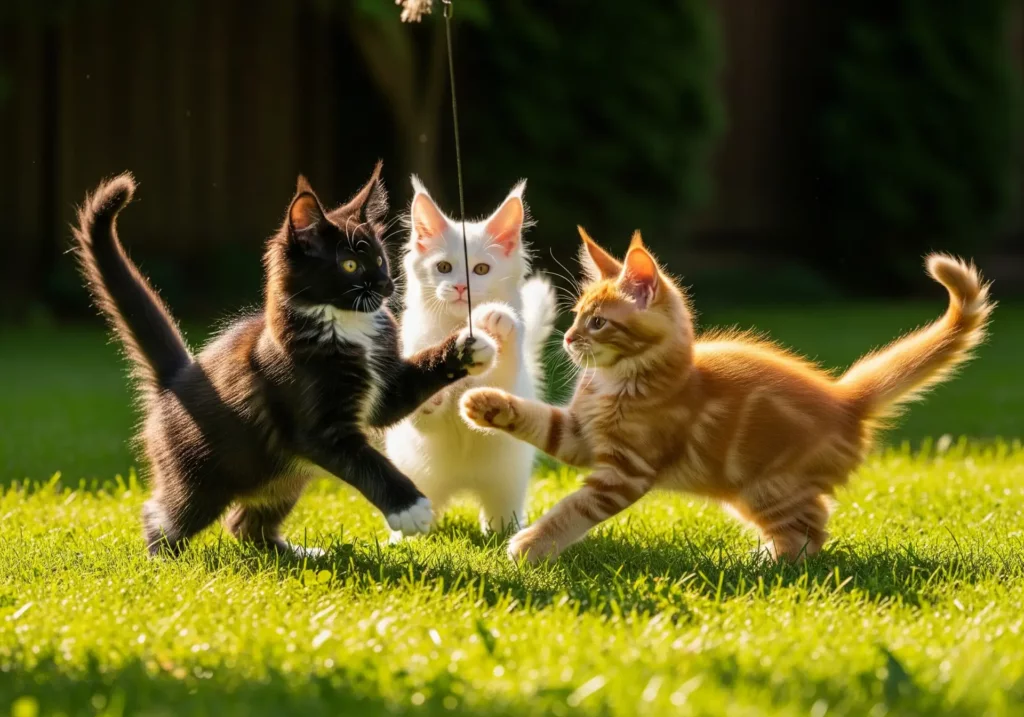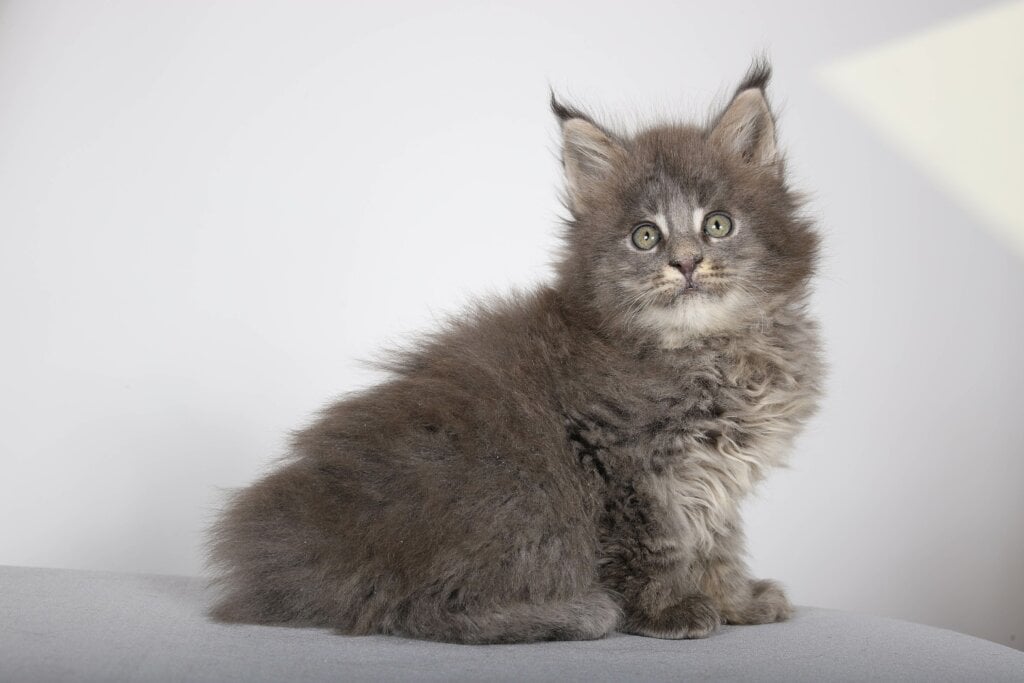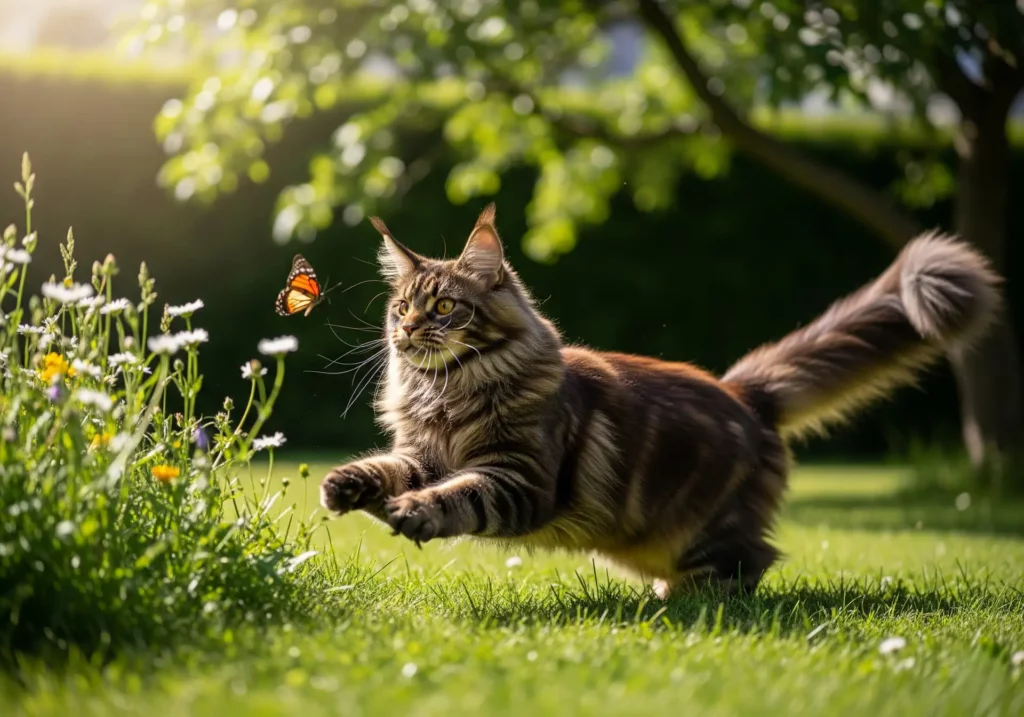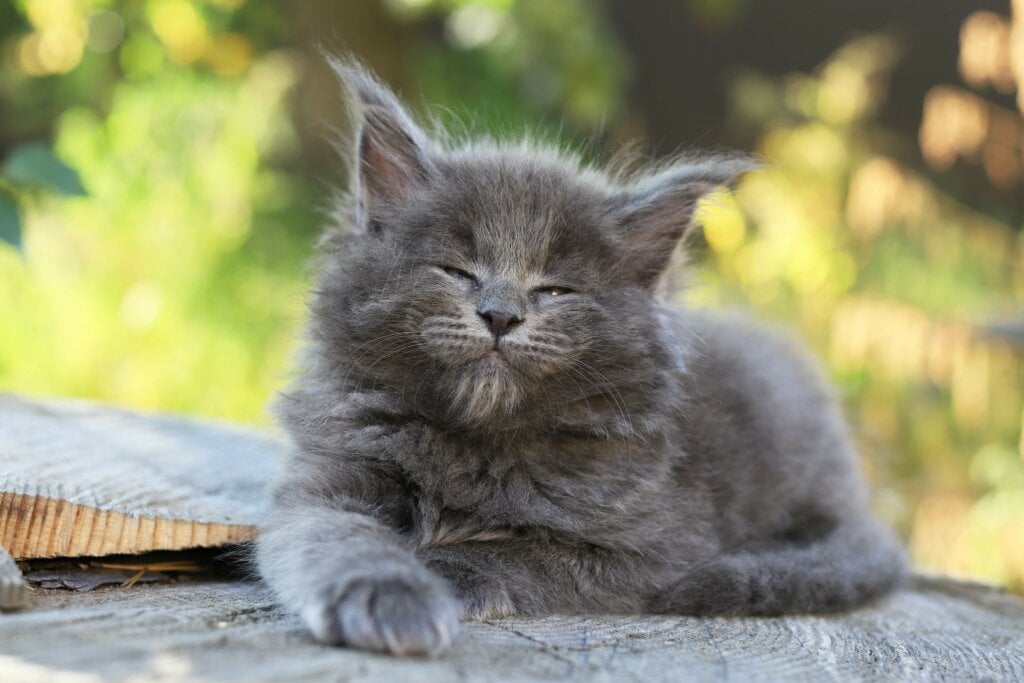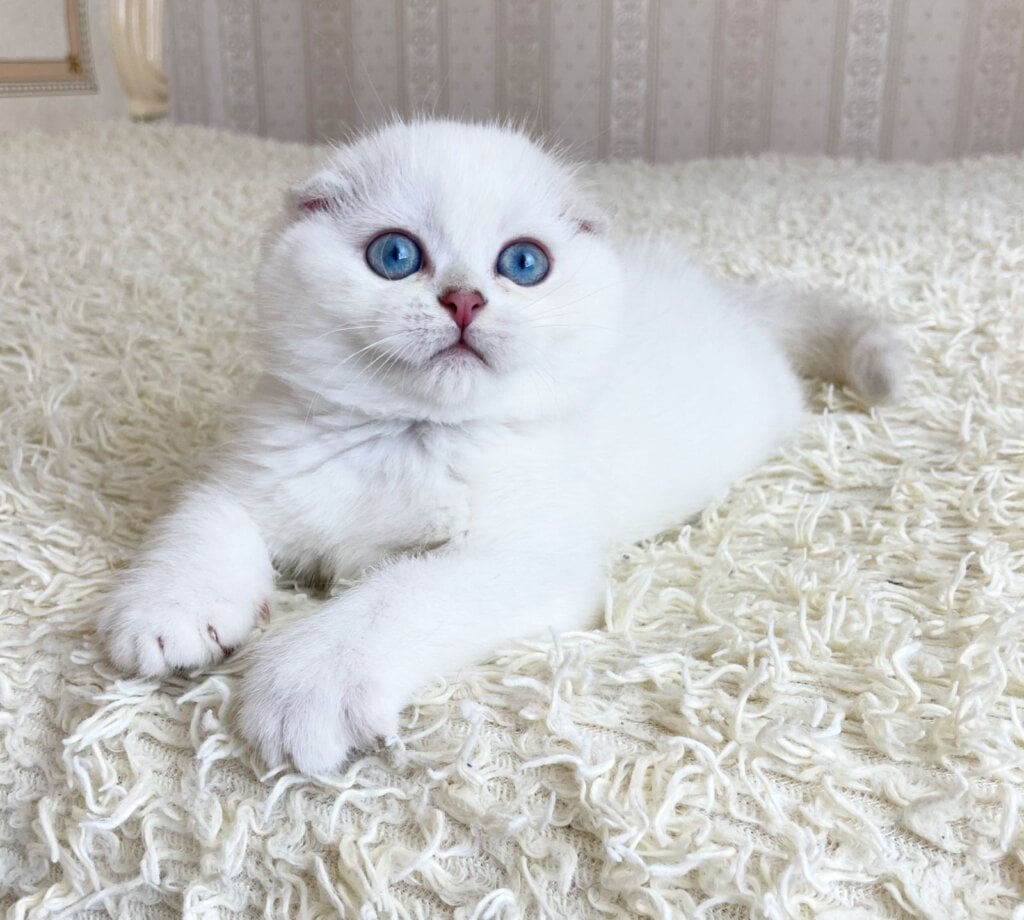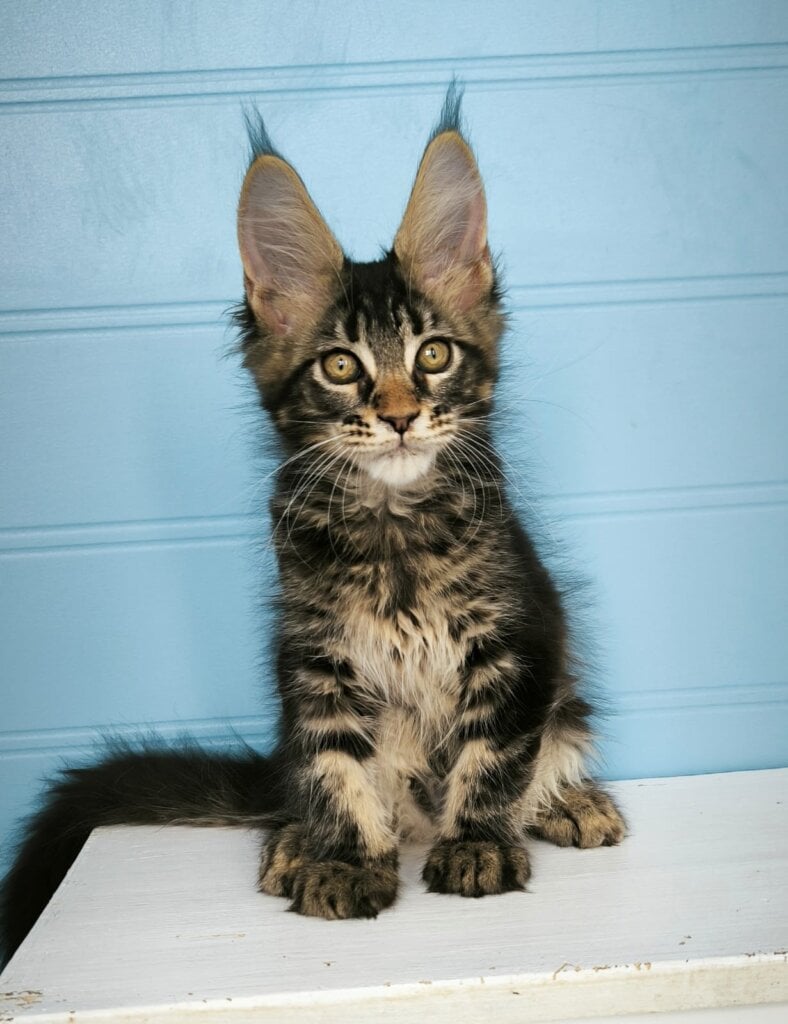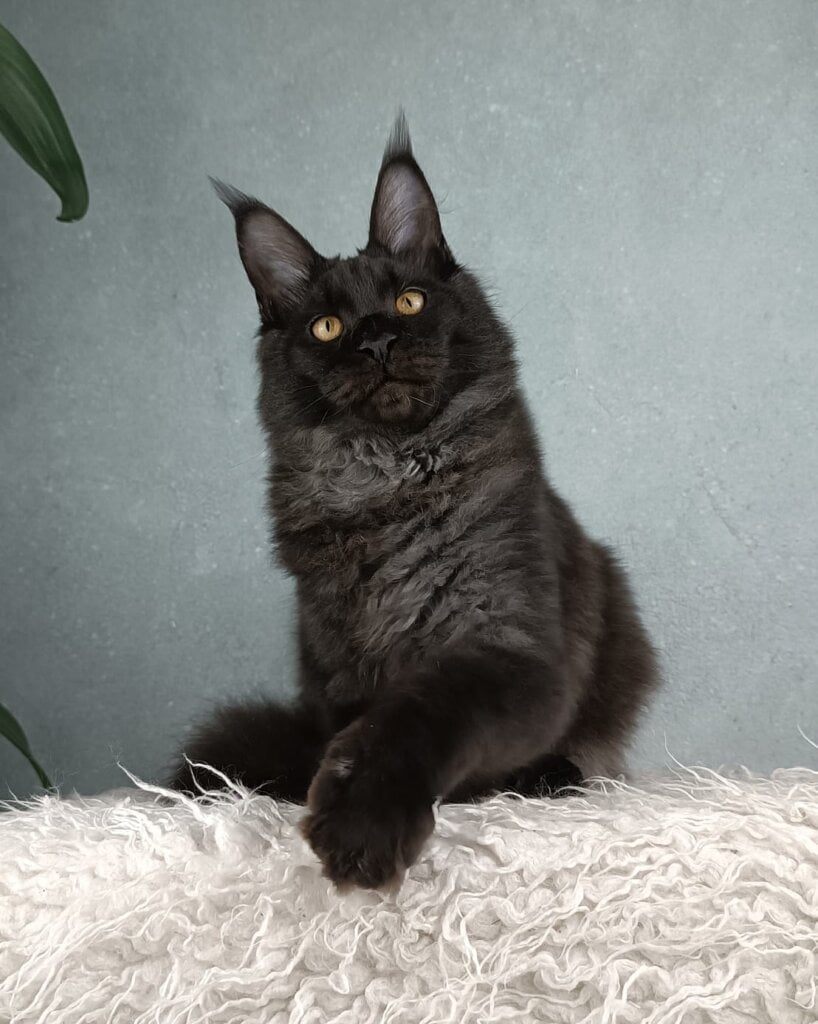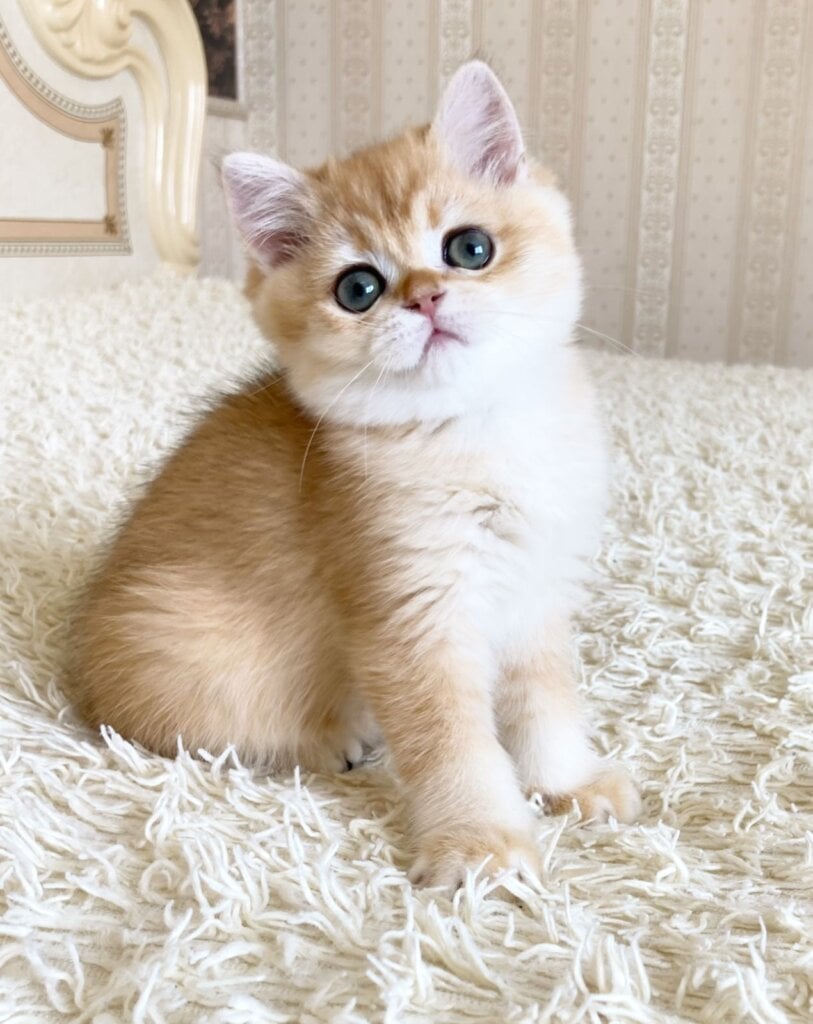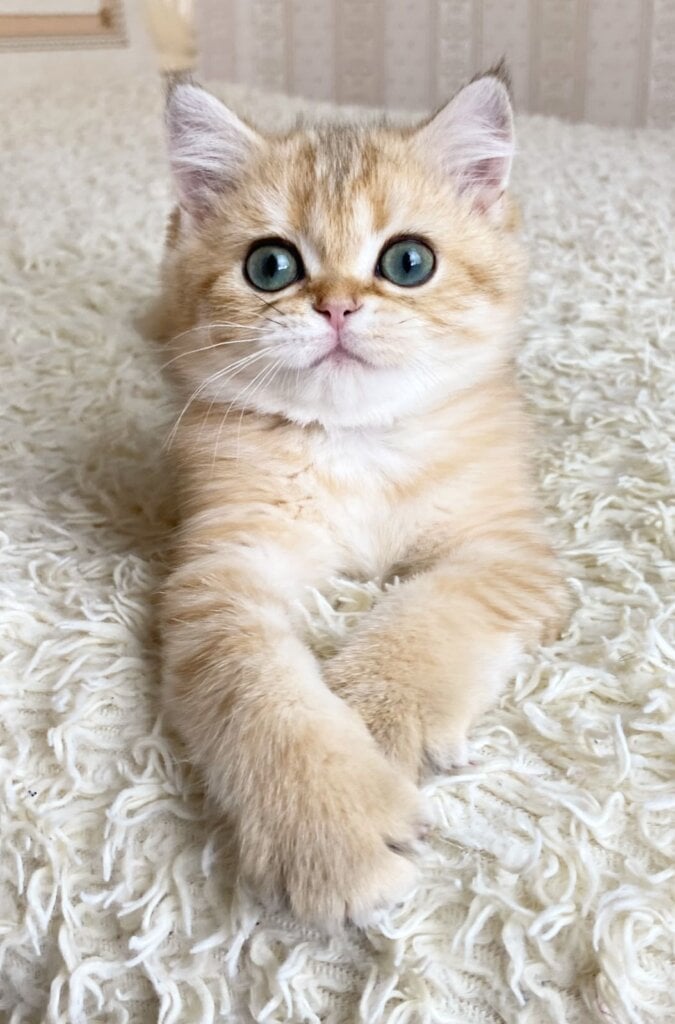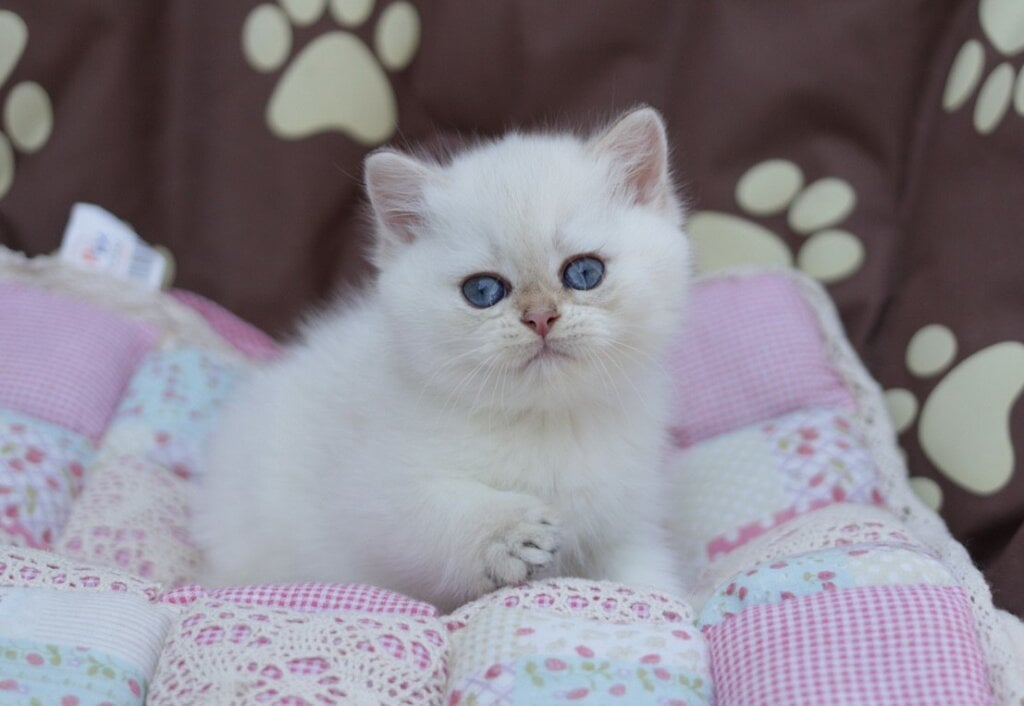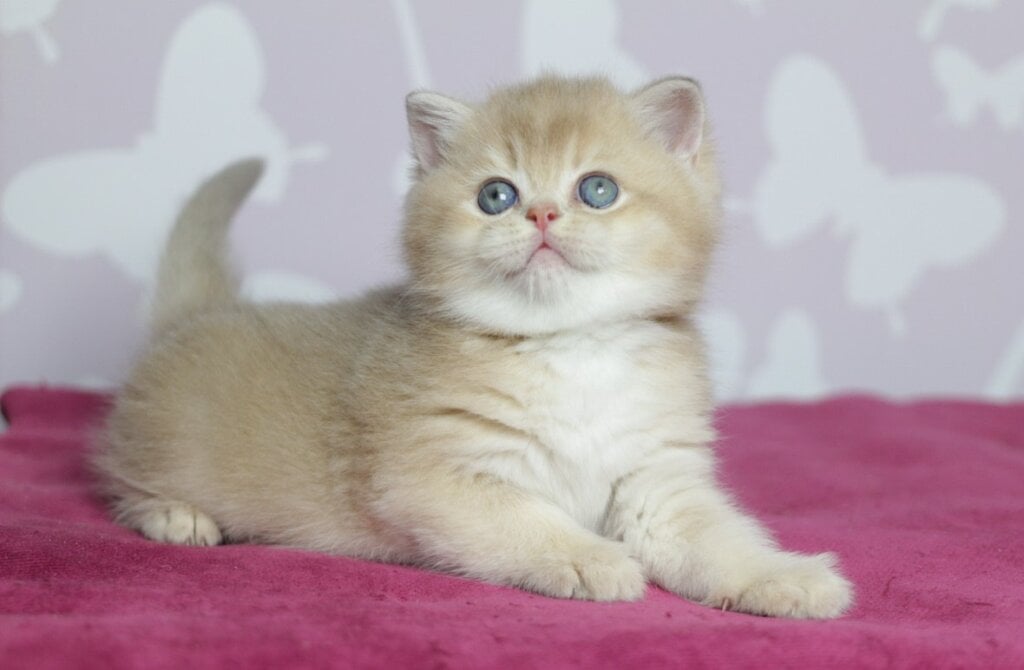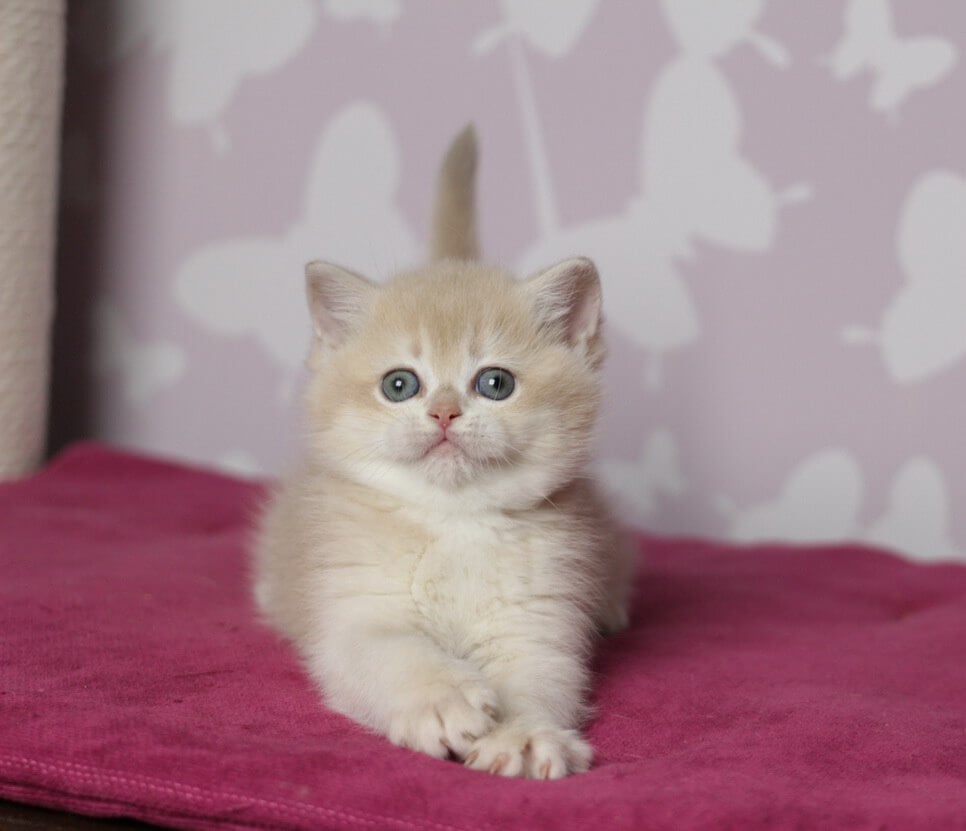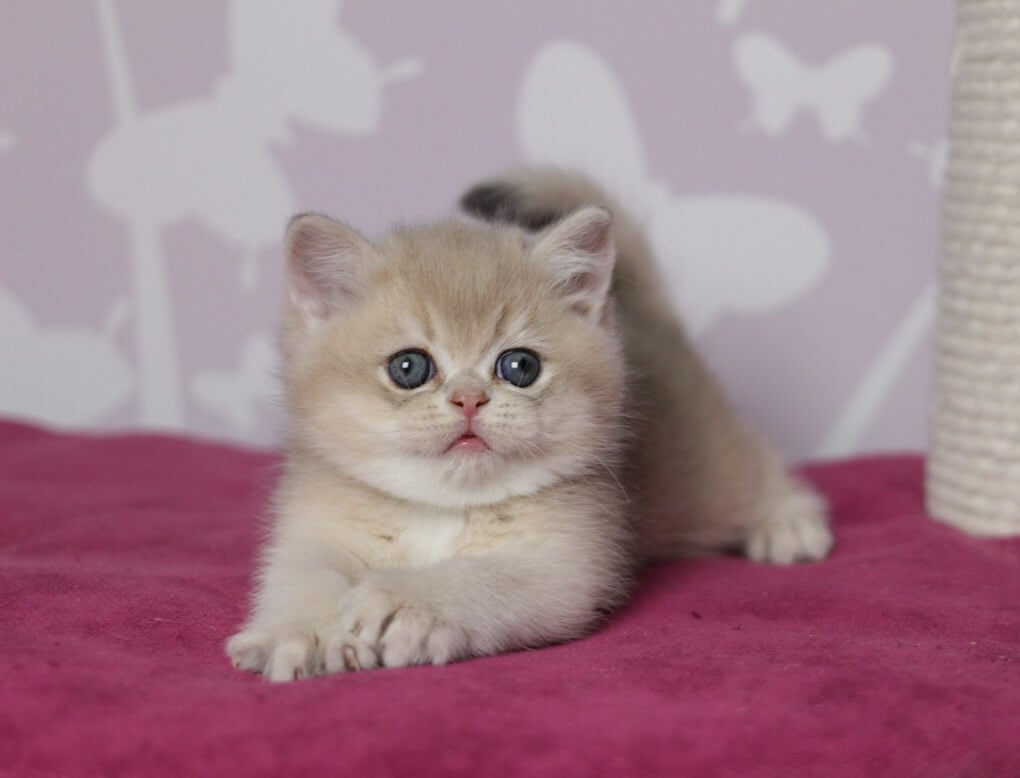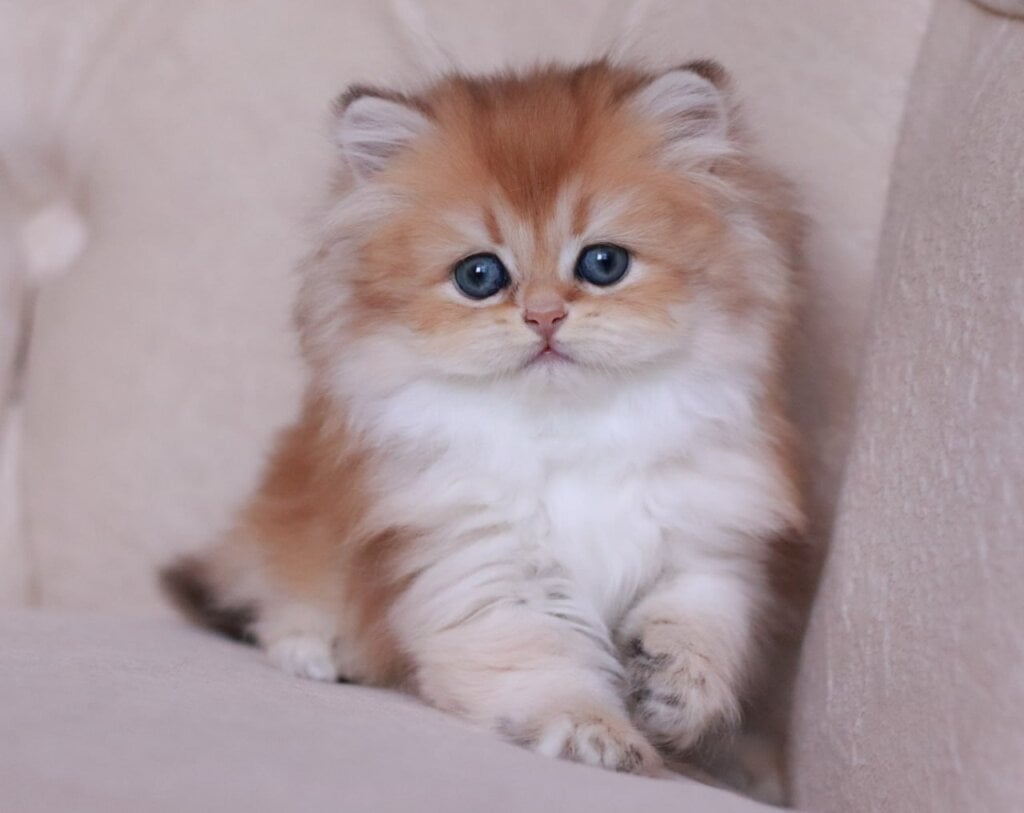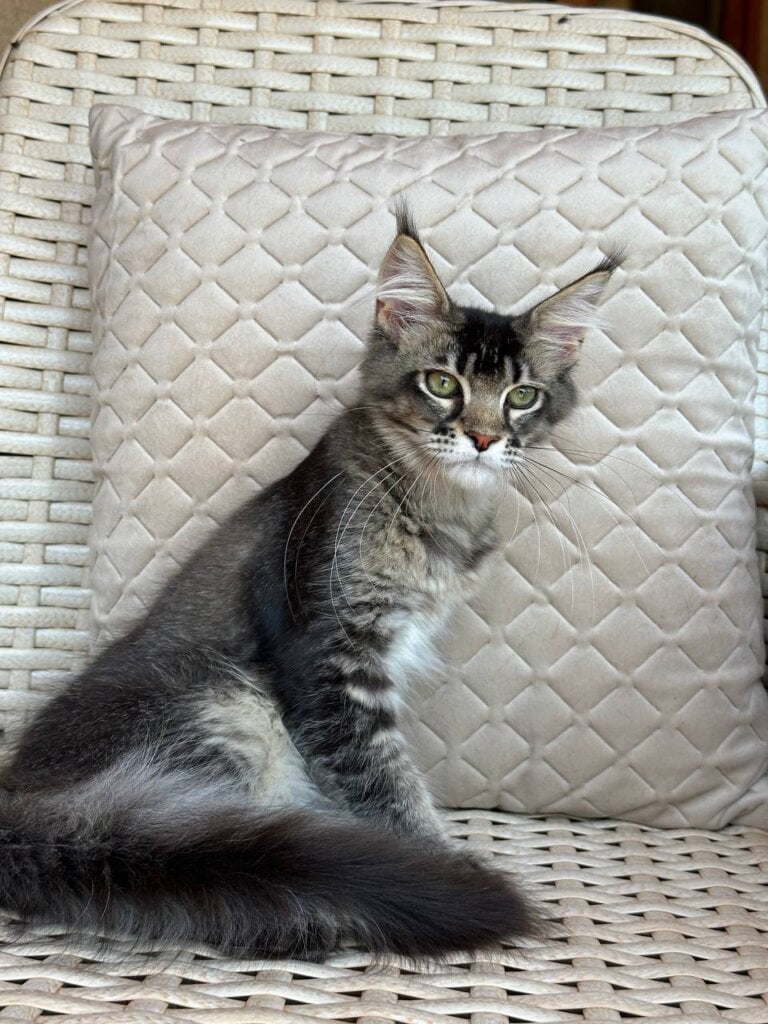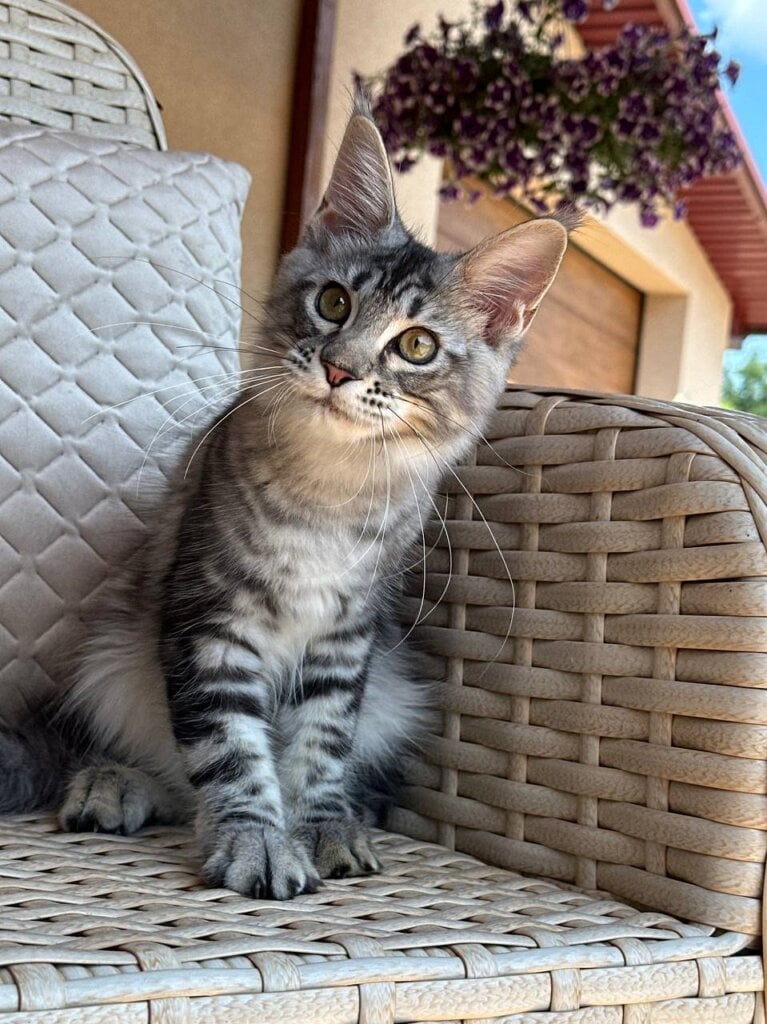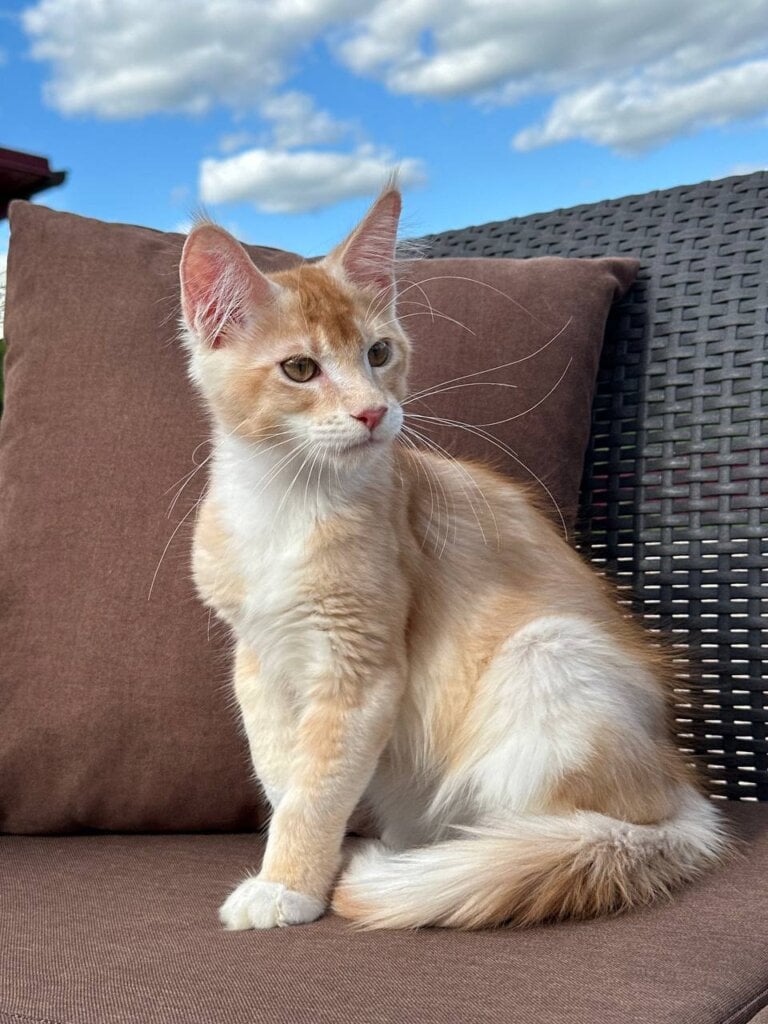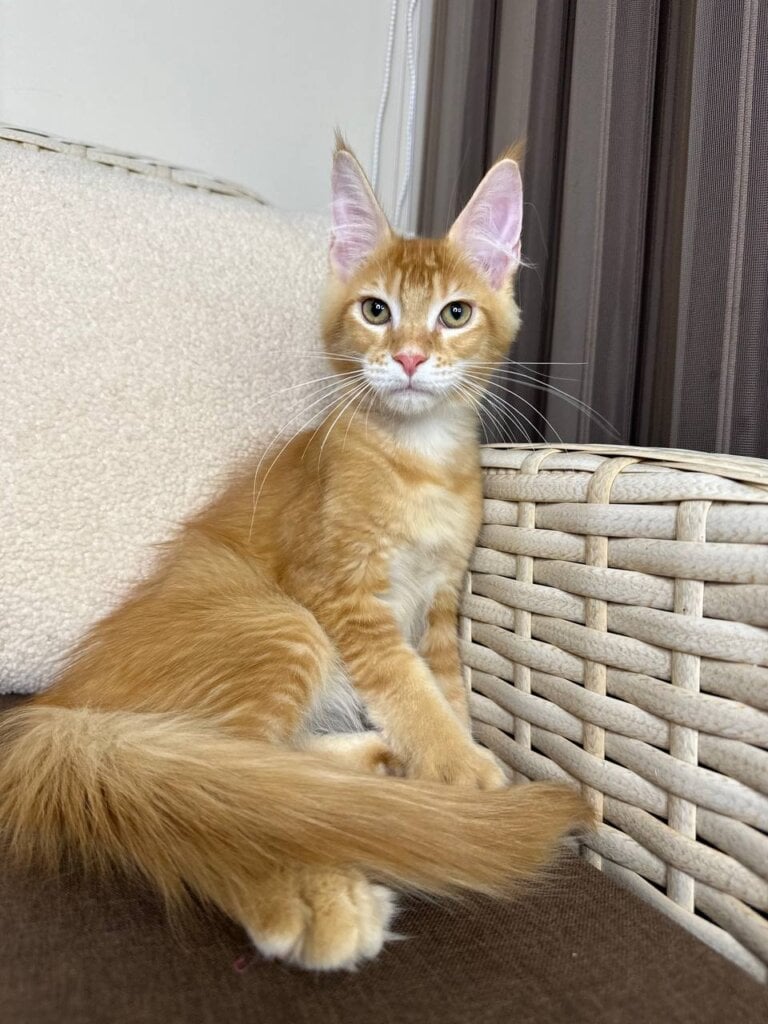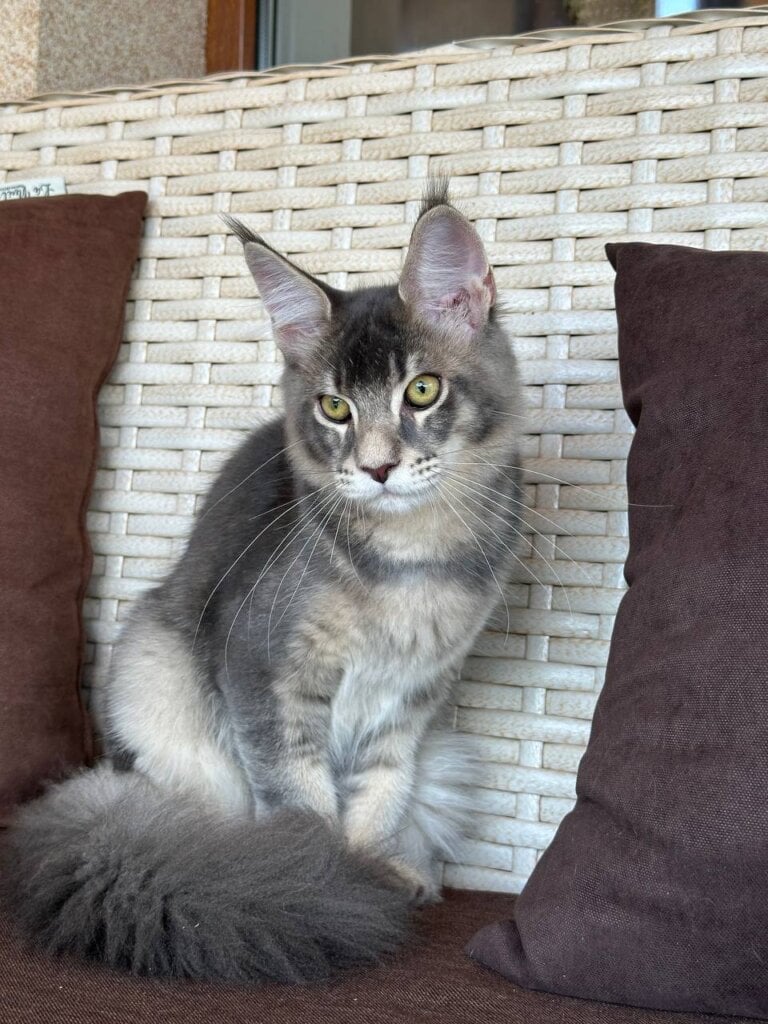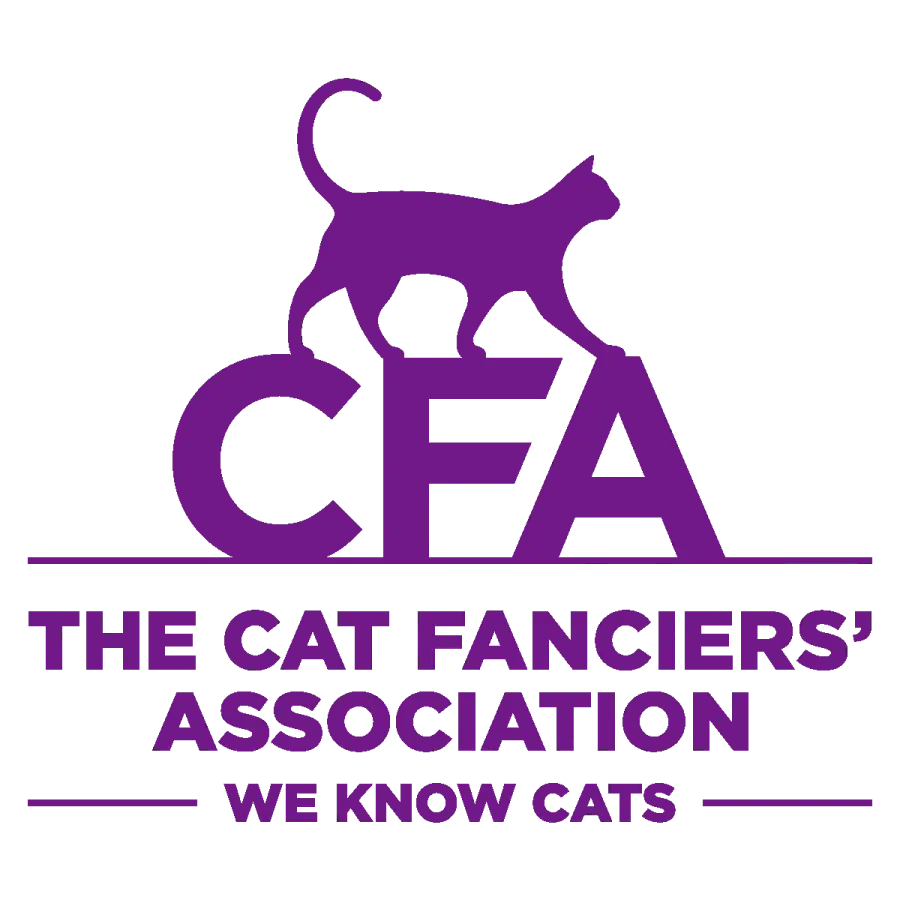What Are Maine Coons?
Size and Appearance
Maine Coons are impressive cats, known for their large size and tufted ears. They can weigh 10 to 25 pounds, with males being considerably larger than females. It is the Maine Coon’s size that serves as one of its most popular and unique characteristics.
In reality, it can be very similar to some of the smaller dog breeds! Their silky coat – which can be any color or pattern – further contributes to their royal appearance. Their coat is long and heavy, providing super insulation from extreme elements.
It does justice to their legacy as accomplished rodent assassins in the frigid winters of Maine. With their tufted ears and bushy tails, they have an impressive appearance. This is what makes them such good navigators – through the snow or thick, Maine Coon forests.
Temperament Traits
As far as temperament goes, Maine Coons are a charming combination of dog and cat. They are one of the smartest breeds and very responsive to training, showing an impressive knack for learning tricks, commands, and even walking on a leash.
This smartness makes them fun, lively pets, who love a challenge and mental stimulation. Maine Coons are cool cats, literally. They are intelligent and social beings that typically develop a fierce loyalty to their human families and surprisingly to their dog buddies.
Their friendly disposition allows them to quickly become the best buddies with dogs, living in harmony and fun. Maine Coons are very playful as adults, maintaining their kitten-like demeanor throughout life.
They enthusiastically play with toys and climb and explore their environment with unbridled curiosity. Their loving nature and desire to participate in family life makes them perfect candidates for a family that’s looking for an engaged companion.
Health and Lifespan
Maine Coons are usually healthy cats, and their life expectancy can reach up to 15 years or even more. Their longevity can be attributed in part to their sturdy weight and vigorous activity. Just like us, they need food that meets their unique dietary needs.
Maine Coons are happiest when eating a diet rich in animal protein, which supports sensitive metabolisms and active lifestyles. Only 2 to 3% of their diet should be carbohydrates, fueling their overall health and vitality.
This is a breed with a very high prey drive. They do best with an active, playful, exploratory lifestyle. Maine Coons thrive on routine, and having a calm, low-traffic area for them to enjoy their meals will give them a feeling of safety and relaxation.
When re-homed soon after weaning, they universalize well and adjust well to new environments. What you’ll need All they need is a large crate or box that gives them room to stretch out. Their sweet disposition and lifelong playful spirit make them wonderful friends for a lifetime.
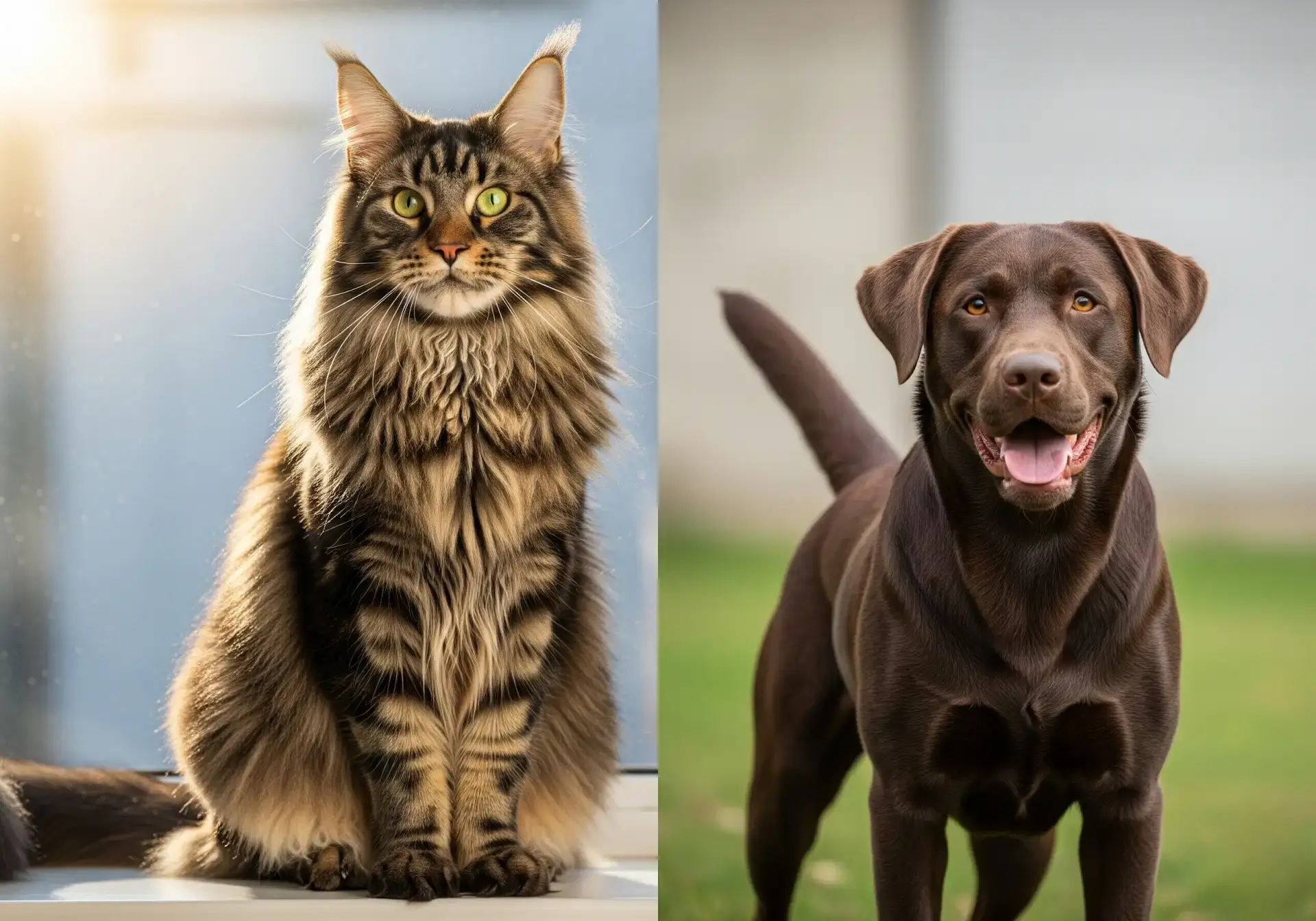
What Are Dogs?
Whether you already have a dog or are thinking of getting one, knowing what dogs are really like is vital. Dogs, because of the vast range of breeds they possess, can provide a more varied experience, with each breed having its own unique characteristics.
Breed Variations
Dogs are one of the most diverse species on earth, with breeds having unique behavioral and physical characteristics. As an example, Border Collies and Australian Shepherds are both breeds with strong herding instincts and high energy levels. Many of these breeds have a high prey drive, and therefore will go after smaller animals including cats.
Breeds such as Labradors and Golden Retrievers are often referred to as gentle giants. Their friendly, easygoing attitude makes them wonderful pets. These dogs are extremely multifunctional. When introduced carefully, they can even live in harmony with other pets, including Maine Coon cats.
Temperament Traits
The temperament of a dog is one of the most important factors in how they get along with other animals. It’s no secret that most dogs have an innate prey drive. This instinct can make things difficult when introducing them to a Maine Coon. Fast-moving prey or small animals can activate these instincts, creating a frustrating tension.
Dogs can be taught to be respectful and relaxed around cats with patience, consistency and positive reinforcement. This specialized training addresses and curbs all natural instincts that could otherwise create stress between the animals.
Health and Lifespan
Being aware of the health concerns and life expectancy of dogs is important for prospective pet owners. Dogs are very susceptible to external infections, such as ringworm or mange, from each other. What are dogs? We know that a healthy diet is the foundation of good health.
To avoid energy depletion, animal fat ideally should be no higher than 20 percent of your intake. The life expectancy of dogs varies widely with breed. In general, smaller breeds live longer than bigger breeds.
With regular health checkups and a healthy diet, you can help ensure your furry friend has a long, tail-wagging life.
Comparing Physical Characteristics
Size Differences
When it comes to size, Maine Coons are giant killers. These regal kitties roam high, with adults ranging from 10 to 16 inches at the shoulder. Add in their tail, and their total length can get up to an astounding 38 inches long!
Males grow to a maximum weight of 18 pounds and a length of 40 inches. This extraordinary size is what makes them the largest non-hybrid cat breed in the world. Some, such as the current record holders, exceed even these measurements.
This is a fairly dramatic size difference compared with most breeds of dog. The relatively small female Maine Coon may be equal in size to a male American Shorthair. These cats typically have a body weight from 12 to 15 lbs.
Maine Coons mature a little slower than average cats, therefore their growth is less abrupt and more consistent over a prolonged period.
Physical Characteristics Comparison
Maine Coons will typically outweigh Siberians and are larger in size. Though both breeds aren’t the dainty type, the Maine Coons win in a landslide. Their physical proportions even carry over to their facial features.
The Maine Coon is easily recognizable by its square head, square muzzle, and high cheekbones. Siberian cats, on the other hand, have a broad, rounded head and short, rounded muzzle.
The Maine Coon has unique and strong physical characteristics. Their unique physical characteristics distinguish them visually and physically from other felines and canines.
Fur and Grooming Needs
Maine Coons are easily recognizable by their long, shaggy coats that add to their majestic presence. To maintain their stunning double coats, they require frequent brushing. Their coats are long and dense, insulating them from the harshest cold elements.
What does this mean for prospective Maine Coon owners? Frequent grooming is key for Maine Coons, as these longer coats are prone to matting or tangling. Regular brushing goes a long way in keeping loose hairs at bay, which makes this grooming step an important part of their care routine.
Other dog breeds have less fur and require less grooming. That’s not the case, because Maine Coons need as much grooming as long-haired dogs do. Their fur is more than skin deep.
While it might make them look cute and fabulously furry, it helps them survive in some of the harshest climates on earth. With an array of colors and patterns to choose from, the Maine Coon’s coat has major visual appeal as well.
This variety only enhances their charm and makes each individual Maine Coon one of a kind. Understanding these grooming needs is crucial for potential owners who want to maintain their cat’s health and appearance while enjoying the companionship of these gentle giants.
Care and Maintenance Needs
1. Feeding Requirements
Feeding Maine Coons requires a different approach than dogs, as these cats have unique dietary needs. These majestic felines are designed to thrive on a diet high in animal protein. Here’s why, though – roughly 80% of their intake must be derived from this constant and essential current.
This incredibly high-protein diet can help support their muscular build, as well as their high energy levels. Unlike dogs, who would eat anything and everything, Maine Coons do best with a standard diet. Providing them with a safe, quiet, private space to enjoy their meals is an important aspect of their comfort and well-being.
A loud new world full of new neighbors can be stressful for them. Providing your pet with a regular feeding schedule will help make their move easier while minimizing their stress.
2. Grooming Essentials
Grooming is one area where Maine Coons need more care than dogs. These felines are known for their striking and long double coat, which requires high levels of care and upkeep. To avoid matting and help share the coat year-round, regular combing – at least twice a week – is essential.
During shedding seasons, daily grooming is usually required to keep their thick double coat in check. Regular weekly combing can prevent mats from forming and control shedding, which is especially important during molting season. We’ve found that this routine really helps to keep their coat nice and healthy – it’s very shiny!
Additionally, it clears up surface skin irritations and allergic reactions in a flash. Regular brushing is one of the most important steps in keeping their beautiful and unique coat lush and healthy.
3. Exercise Needs
Exercise needs for Maine Coons versus dogs can be very different. While other dog breeds may need to be taken for daily walks or runs to expend energy, Maine Coons are more self-retained. They are very active animals and enjoy playing and climbing.
To fulfill their desire to climb, give them vertical spaces such as cat trees or wall shelves. Keeping them moving with interactive toys or squeaky laser pointers will help, too, Evans says. Maine Coons are very happy living in an indoor environment.
Keep them busy with the right stimuli; these dogs will always be engaged and active!
4. Veterinary Care
Though Maine Coons are more cat-like, their veterinary needs may differ. Maine Coons are overall a strong breed, but regular veterinary visits are essential to ensure they stay healthy and to catch common feline ailments early.
Vaccinations, dental care, and routine health screenings should be a standard practice for their care. Dogs typically require more vet visits. An outdoor lifestyle means that they are exposed to more environments and health risks.
The single most important thing you can do is build a relationship with a veterinarian. They’ll know your pet’s individual needs and be able to offer the highest level of care and comfort.
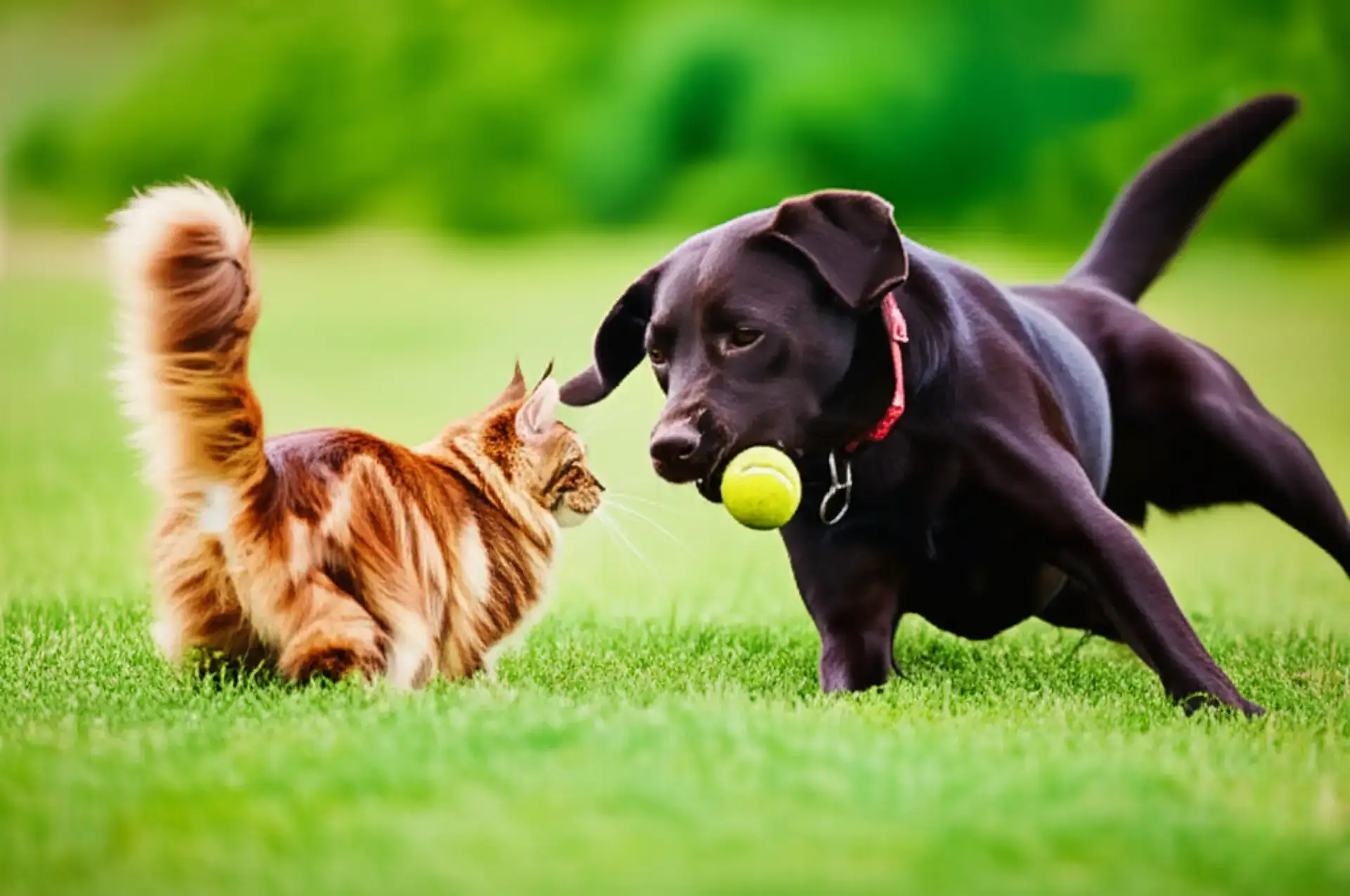
Behavioral Differences
Finding out just how different Maine Coons and dogs are can be a real wake-up call. Each pet is different, with individual needs and personality traits that determine how easily they’ll mesh with a family.
Socialization Needs
Maine Coons require social interaction but usually when they want it. They are incredibly smart and can be mesmerizingly entertaining. These playful cats will even leave you amazed by bringing you a favorite toy or playing fetch or hide and seek with you.
Their socialization is not so cut and dry. They’re not always social butterflies and will express their dissatisfaction if they feel neglected, especially in homes with multiple pets. Maine Coons tend to be more relaxed in temperament.
They can be very intolerant to even subtle changes in their environment like a new dog coming to town. They often get along well with doggy companions, but their larger-than-life attitude and stature may scare off littler pups. Maine Coons aren’t as needy for socialization as dogs.
Rather, they like to control the tempo of their activities, particularly when it comes to socializing, in their formative years.
Training Approaches
Training a Maine Coon can be a challenging but highly rewarding experience considering their great levels of intelligence. They’re very intelligent dogs and do best with training that engages their brain and is built around positive reinforcement.
Maine Coons do best in active, engaging educational settings. Unlike dogs, which usually require more formal training sessions. Their capability to respond to verbal cues and engage in constructive play speaks to their intelligence.
One needs to be patient when heading into training as Maine Coons do not always follow the book. Just like dogs, canines require structure and need a consistent training routine to thrive.
This arrangement serves to make their behavioral reactions more uniform.
Interaction with Humans
Maine Coons have a playful side, but interactions between these cats and humans are typically based on respect and love. These felines make wonderful pets and frequently become devoted friends, attaching closely to their human family members.
What’s interesting is that they’re very attuned to their environment but highly attuned to body language. This increased vigilance can often result in misinterpretations, particularly in households that include dogs.
Maine Coons are generally adaptable, but individual responses to dogs may vary. These reactions usually are contingent on the dog’s behavior and energy level.
Dogs, on the other hand, tend to pursue human attention more deliberately and are more prone to vocalize their desire to go outside. Though they crave love and attention, Maine Coons seem to thrive on maintaining space, and a calm cohabitation often takes precedence for these felines, differentiating them in their behavior.
Choosing the Right Pet
Choosing the right pet for your family is an important decision. Lifestyle, space availability, and home environment all play a part in the decision making process. Let’s dig into these considerations side by side! We’ll decide if a Maine Coon or a dog will be the best furry fit for your household.
Lifestyle Considerations
Both Maine Coons and dogs can make wonderful and unique companions. Since they are so intelligent and trainable, Maine Coons make excellent choices for first-time pet owners. They flourish in households that encourage family dynamics. They appreciate having a quiet nook for mealtimes and alone time.
This breed doesn’t have a lot of health issues. It is still imperative to be on the lookout for predispositions to conditions like hypertrophic cardiomyopathy (HCM) and joint disorders. Having regular vet check-ups is important to ensure they stay healthy. A balanced diet is just as important. They are very prone to getting overweight.
Dogs usually require more time and dedication, particularly larger breeds with energy outlets that include daily walks and playtime. They are just as rewarding and offer loyalty and companionship that is hard to beat. Dogs can be excellent for active families and can offer therapeutic comfort, which is particularly helpful for individuals facing mental health challenges.
For many mental health professionals, this isn’t just a happy coincidence – they actively advocate for pet ownership as a therapeutic measure. Maine Coons and dogs play critical roles in deepening well-being.
Space and Environment Needs
Your home environment will help you decide what pet fits best. Maine Coons, with their noble stature, thrive in spaces where they can stretch their long legs and explore their surroundings. They’re very versatile but do appreciate a more peaceful environment that suits their routine loving disposition.
It’s important to create a positive, low-stress introduction to other pets. A gradual and purposeful introduction reduces stress, paving the way for a harmonious life.
Dogs, especially the larger energetic breeds, need even more room to move around. They usually require a backyard or frequent access to large parks to romp around. Ragdolls are another breed of cat that adores tranquil homes. They like to bask in attention, but not in the environment that many dog breeds are wired to flourish in.
